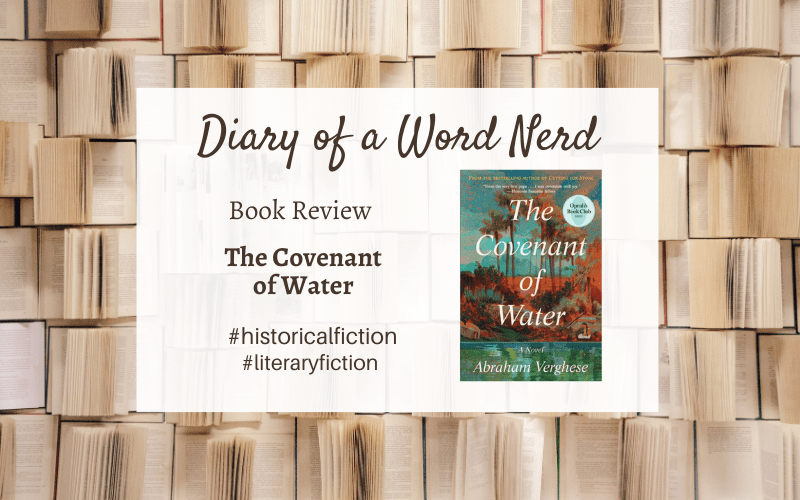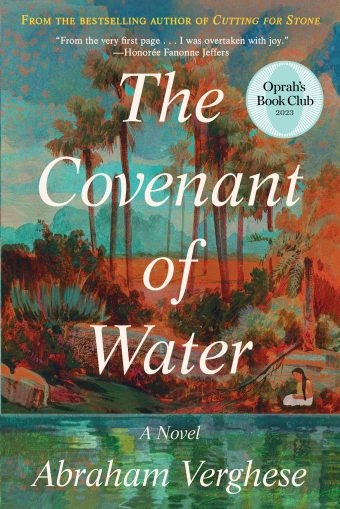What would motivate me to tackle a 724 page novel? The recommendation of my mother-in-law, an avid reader with good taste. So, in the midst of holiday chaos, I started listening to the audio book of The Covenant of Water, written and narrated by Abraham Verghese. All 26 hours of it.
Finishing The Covenant of Water requires commitment, and now that I’m on the other side, I definitely think it could have been streamlined. But the writing is gorgeous, and the main characters intriguing, so I persevered to the end, and I’m glad I did.
Premise
The Covenant of Water covers over seventy years in the life of an Indian family living in Kerala, on India’s southwest coast. Starting in 1900 with a young girl leaving her home for an arranged marriage, the story covers three generations of interesting characters, a lot of them women. Covenant explores themes of faith, sacrifice, oppression, and family bonds. It also celebrates the practice of medicine and advances in the field during the 20th Century.
What I liked
Verghese writes gorgeous prose. The beauty of his words held me captive, even when the plot dragged a bit. Here’s a quote from the beginning of the book, when the matriarch (“Big Ammachi”) of the family considers the power of story as her granddaughter begs to learn more about her ancestors.
What the child clamors for is the story of their own family, of the widower’s house into which her grandmother married, a house full of mysteries. But such memories are woven from gossamer threads, time eats holes in the fabric, and these she [the grandmother and storyteller]must darn with myth and fable.
One of the main characters, Philipose, watches helpless as his best friend, a member of the pulayar, or servant caste, is rejected from the local school. The teacher says, “I’ll starve before I raise up children of the mud.” This scene follows:
At home, Philipose spills angry tears and tells his mother all. The world’s hypocrisy burns on his face. Big Ammachi holds her little boy and rocks him. She’s ashamed. The injustice he witnessed isn’t the Kaniyan’s [teacher’s] fault alone. Its roots are deep and so ancient that it feels like a law of nature, like rivers going to the sea. But the pain in those innocent eyes reminds her of what is so easy to forget. The caste system is an abomination. It is against everything in the Bible. Jesus chose poor fishermen and a tax collector as his disciples, and Paul said there is neither Jew nor Gentile, neither slave nor free, nor is there male and female, for you are all one in Christ Jesus. They are far from being all one.
I also liked the strong female characters in the book. Big Ammachi, (I think this name means “Big Mother”) develops from a young, scared 12 year old given away in an arranged marriage into the respected matriarch of a blossoming family. I loved Big Ammachi’s frequent, casual discussions with God, and how she turned to her faith in times of distress. She is a model of sacrifice and love. Her granddaughter, her namesake, travels far from home to study medicine and uncover the secret to her family’s mysterious medical malady, a fear of water and a history of drowning. The two share a close relationship, and an uncompromising sense of bravery.
Finally, like all good historical fiction, The Covenant of Water helped me understand some of India’s history and culture. I had no idea Catholics lived in India, but yes, a population in South India still exists today, tracing their lineage back to St. Thomas, the apostle who doubted Jesus after his Resurrection. I also learned more about leprosy, a disease poorly understood and a reason for social oppression, along with the caste system.
The Covenant of Water made clear, despite our knowledge of history and our advances in science and philosophy, that we humans embrace prejudice and oppression far too easily, across space and time.
And I haven’t even touched on the doctor from Glasgow.
What I didn’t like
Although the writing is gorgeous, the book felt long. Verghese gives a lot of time and attention to characters and plot lines that don’t contribute significantly to the main story. I’ve seen his plot described as “ambitious,” and I agree. I think the book could have been stronger, and would hold attention better, if Verghese focused his immense talent and intellect on a narrower plot and a smaller cast of characters.
Recommendation:
I listened to the audio book of The Covenant of Water, narrated by Verghese. His Indian pronunciation brought depth and context to the story. It was a great way to experience what felt like an oral history. Verghese’s voice conjured up the presence of an old grandfather, revealing family secrets on a warm day on India’s southwest coast.
You can find interesting illustrations, a summary, and a character list for The Covenant of Water at Verghese’s website.
If you enjoy historical fiction, you should try The Covenant of Water. Just brace yourself for a long read.
Have you read The Covenant of Water? Who was your favorite character? What did you think of the length?
Thanks for getting nerdy with me!




I agree with your comments about Covenant of Water. I am going to ask our book club what images stayed with them after they finished the book.
Great! I’m glad you found my post helpful. What stayed with you after reading Covenant? Would you read another book by this author?
Bumping it up on my reading list now!